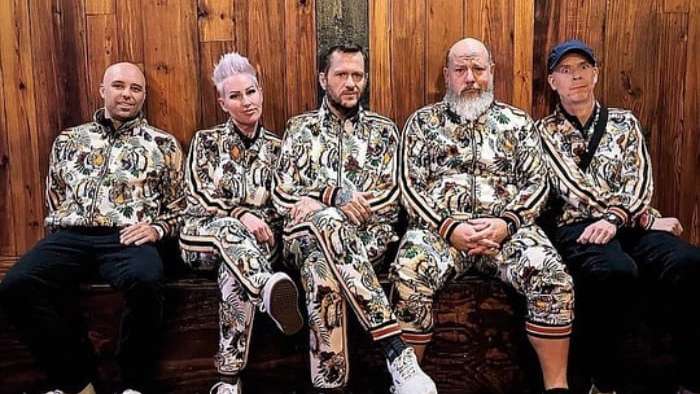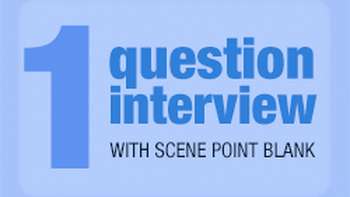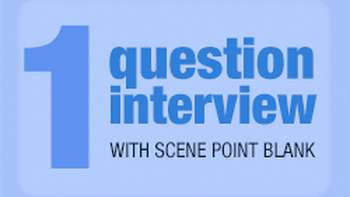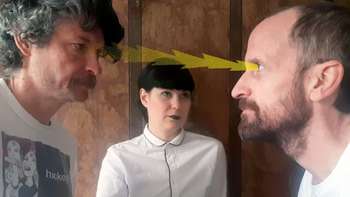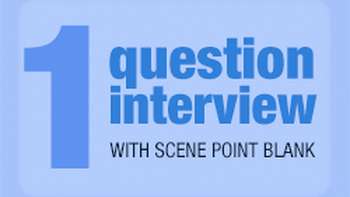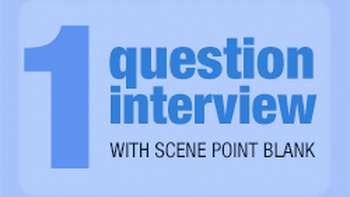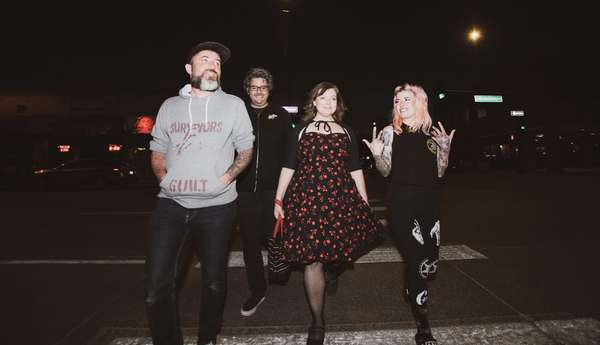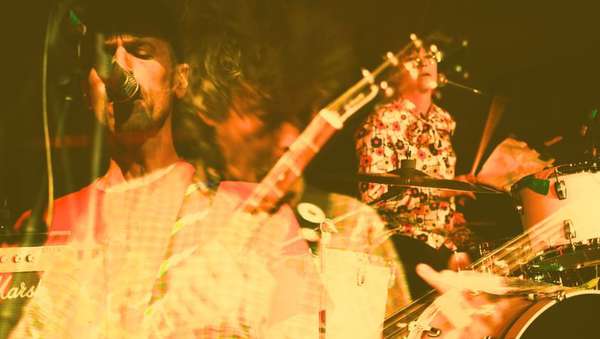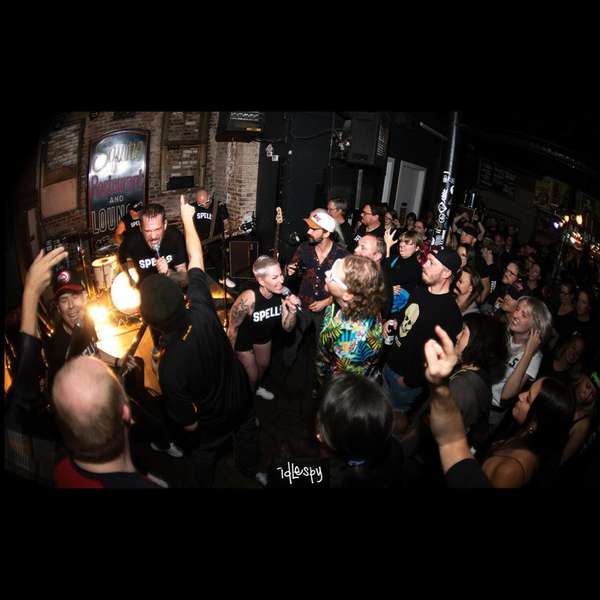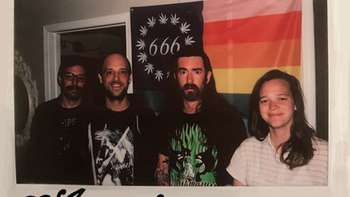Part of the fun of running a site like Scene Point Blank is that I’m continually getting packages in the mail. I prefer physical media, even if it gets overwhelming sometimes. Related to that, it takes a lot to stand out from the pack. But as I began receiving promos from Snappy Little Numbers some time ago, their packages did stand out. There was a brand behind the label, a unique style and a dedication to the artwork as it fit with the music.
I honestly don’t remember if I’d heard SPELLS before or after this, but getting into SPELLS’ work only confirmed my interest more.
So, fast forward a few years and another dozen or so releases from the label, and I reached out to learn more about how the label operates.
Here’s an interview with Chuck Coffey, Owner & Operator of the label.
Scene Point Blank: The first thing that struck me when promos started showing up in my mailbox from Snappy Little Numbers was that you put real effort into packaging. It's changed over the years, but you make real physical packages, whatever the medium (flexi, cassette, LP, etc). What was your inspiration or idea when you started SLN?
Chuck Coffey: I originally conceived of SLN as a 45 singles label more than anything else. I always liked the immediacy of 45 singles (2 songs, A-side/B-side only!) back when they were the dominant format in music (1950s-1970s give or take). I thought that record labels having consistent center label art and company sleeves was really sharp. I drafted the first gold company sleeve and center label format and turned them over to my friend Jenn Dewey (Eyes & Ears, SPELLS), who is a real artist and brought it all to life. I never thought I’d get past 10 releases, so as things kept moving forward and I stayed flexible with multiple formats, I still wanted to try and come up with some consistency with the packaging. My other bud Rob Burleson (SPELLS) has really come up with some great concepts over the last few years that still tie things together no matter what format(s) a release is in.
Scene Point Blank: If you can't tell from question 1, I think SLN makes some standout packaging (in addition to the music). What goes into deciding how to make the whole release come together as one single concept? Does it start with the label or with the artist?
Chuck Coffey: It can be either or both, really. I want the artists to have control over their creations, but I do like having some of those aesthetic constants that have been a part of SLN for 13+ years. Thankfully, most artists like being a part of the aesthetic while still coming up with ways to make their releases individual. Quite often a band will present an art motif for their record that will then get used for future releases too.
Scene Point Blank: How has that idea evolved over the years?
Chuck Coffey: The idea has evolved at the pace of the artists I work with, really. I had only thought of the 45 angle originally, but then the second release wound up being an EP. I had a brief identity crisis when the band (25 Rifles) wanted to do sleeve art, but it quickly became an opportunity to establish a similar style for EPs to distinguish them from 45 singles while still looking like an SLN artifact. That just kind of applied as other formats were considered. Format costs and band activity play a role since vinyl is so costly and some bands don’t play often enough that they want to take on that big of a commitment. That’s where cassettes first came in, followed by flexis and CDs. LPs have become our most frequent physical format and there have been some viable short-run options lately to help bands achieve a vision without blowing up the budget.
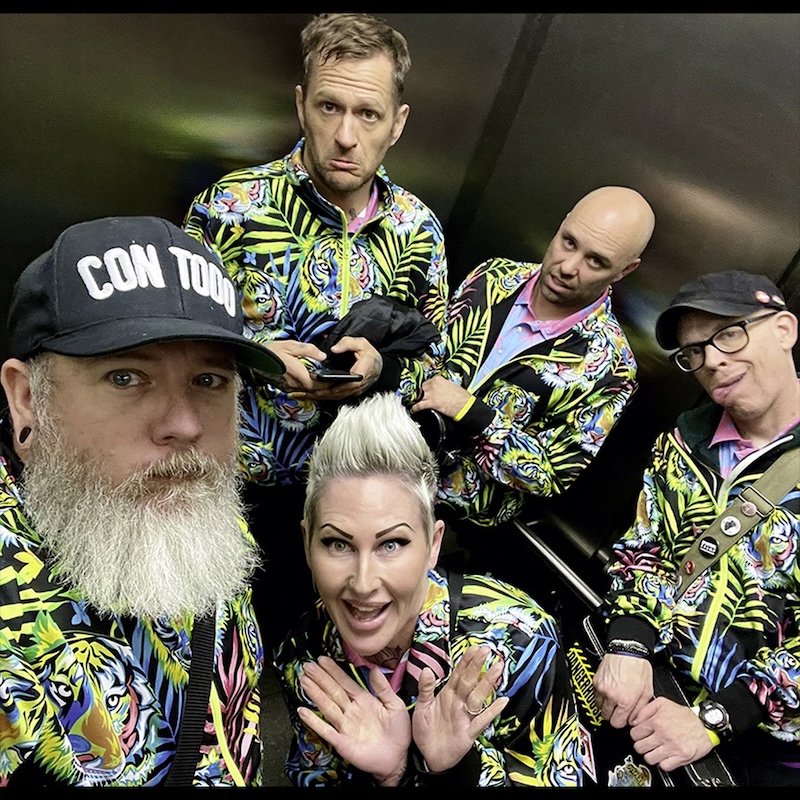
Scene Point Blank: Tell us about your first release. Not so much the band/record, but what were the biggest surprises in getting it made and into people's hands?
Chuck Coffey: The first release took a bit to decide on. I wanted it to be a classic 45 single and the way things worked out, it was a 2-band split where each band had 1 song. So, classic single in terms of format and packaging with a tweak to include two bands as the inaugural release (Eyes & Ears and Snake Mountain). Luckily, I had run another label with my friend Don Bersell (Eyes & Ears, SPELLS) called Not Bad Records from 1997-2010. When I decided to start up a new label in 2011 it wasn’t like starting from scratch. I had relationships with vendors and knew the ins and outs of getting an idea from a starting point to a complete physical (and digital) release.
Scene Point Blank: Do you remember the ins and outs of getting your first record ever made, presumably with Not Bad Records (from a production perspective)?
Chuck Coffey: Yes, surprisingly! It was NBR-001, a split 7" with my band at the time Mail Order Children and another Denver area band called Qualm. Don (my label partner) and I asked some of our friends that had pressed records what they did to get things made. With their advice (Dave Paco with Paco Garden Records was instrumental), I took point since it was my band and called up United Record Pressing to get the specs on placing an order.
This was fall of 1997 and the rep that helped me at United was Beth Proctor. Whenever I use United to this day, Beth is still my rep. It's pretty cool! But back to 1997...
Once I had the recordings from both bands I filled out the order sheet and sent everything in. I remember the test presses came back as large hole records and I only had small hole records in my collection at that point. I secured a spacer and spun a couple. It was very cool hearing something I was part of on vinyl for the first time. After approving the tests, it was time to start thinking about artwork for the sleeves. The short version of that story is that both sides were cut and past efforts from each band. We then took the original print master, scotch tape and all, to a Kinkos in Boulder and ran 1,000 black and white copies to match the number of records we ordered. My bandmate Phaedra Lankutis was with me at Kinkos and we cut and folded the first few hundred ourselves right there. She was studying to be an architect and was way better at getting them done than I was.
We had the completed records ready by the end of November 1997, but it didn't occur to us to have a release show until January 1998. So the record was out for two months and then we had a show in Boulder at Club 156 with both bands and a couple other local bands we knew. I don't remember much about the show itself, but I do remember the feeling of accomplishment and support from so many people. I've been at it ever since!
Scene Point Blank: Was SPELLS active or were you playing music when you started the label? (How many people "run" the label?)
Chuck Coffey: SPELLS was not a band yet when SLN started. I was in a band called Eyes & Ears, as referred to above. We were kind of winding down when SLN started. I suppose that E&E and NBR being put to bed around the same time was a nice bookend to that era of my musical life. SPELLS started a couple of years later.
Scene Point Blank: Do you make a conscious effort to separate your band from your label? How do you approach that inevitable connection? (Do you think about it at all?)
Chuck Coffey: I do think about the connection between SPELLS and SLN but I also think about the connection SLN shares with so many other bands too, including other projects I do. The main reason I wanted to do a record label in the very beginning was to have a vehicle for releasing music that me and my friends made. I didn’t want to have to depend on other people to make things happen and Don felt similarly back when we first started NBR. Having a record label is a community thing: a home for people and their music that are in my life creatively and beyond. I’ve always drawn a ton of influence from Dischord Records in terms of the documentation of things happening around me. SLN isn’t specifically Denver-centric but there’s still a thread that runs through all the artists I’ve gotten to work with. I try to be fair and even with the attention I devote to each release, whether it’s SPELLS, one of my other bands, or one of the other incredible artists that have graced the roster. Furthermore, SPELLS and SLN have worked with many other labels over the years too. Although both SPELLS and SLN take up space in my mind, I’m usually pretty good at being a band member when it’s band time and a label guy when it’s label time.
To answer the last part of the question, it’s just me that runs the label. That answer does come with an asterisk though, I’ve had and have many fantastic people help out over the years with different aspects of the label both large and small. I try and share credit where due. I could never do this without the ongoing support of my extended musical family.
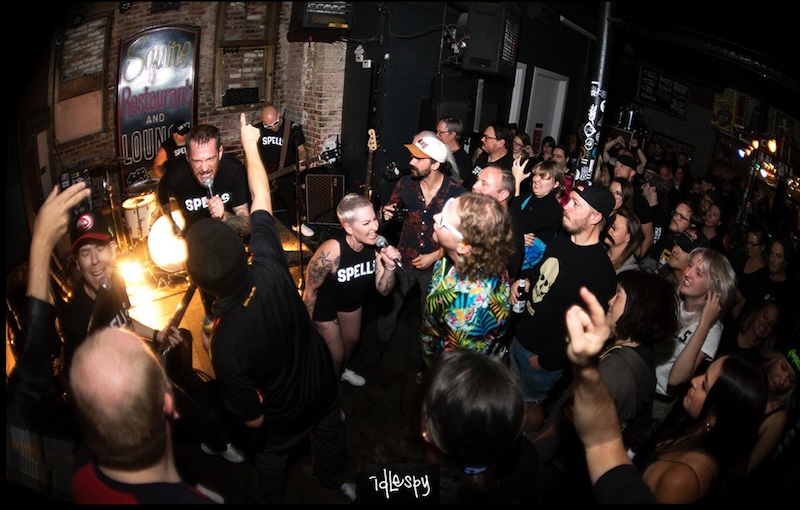
Scene Point Blank: My impression is that you work with a lot of local artists and something of a western states and midwest base, but not exclusively either. How does your average new label signee tend to become involved with the label?
Chuck Coffey: I indeed work with a lot of local artists and that goes back to the Dischord influence. Since I see and know more artists from Denver, that’s why a lot of the roster at any given time has more Denverites on it than people from other places. It’s not necessarily intentional, it’s more of a situational thing. If I lived somewhere else but had the same life, that town would be very well represented across the roster. As time goes on, I’ve gotten to help release records by multiple artists from other cities and countries. SLN is very relationship based and I’ve been in bands that tour in some fashion for 25+ years. Because of that, I have a lot of good friends I’ve met outside of Denver and the desire to help them is just as strong as anyone in Denver. 90% of the people in the SLN family have come on board through friendship. I also like the music.
There’s plenty of audio merit involved too. I have worked with artists based off demos or completed recordings that have been sent to me that knocked me over, but those folks wind up becoming friends. One big difference with SLN compared to a lot of other labels is that bands fund their own pressings. This way we’re all working together and I’m able to release more music than if I was a traditional label with financial resources. Under this model the band then gets the bulk of sales money, and I receive a small percentage for the work I do. Because of this arrangement, my label decisions are largely motivated by what an artist is trying to accomplish. I don’t have to worry about how well a record may or may not do. The artists make the decisions regarding format and understand the risks and rewards of those decisions. My job is to help get the music to as many ears as I can and be a steady base of operations where people can trust me with their music.
Scene Point Blank: Do you accept demos? If so, any favorite memories?
Chuck Coffey: Yes, I absolutely accept demos. I listen to everything that gets sent to me. I respect the time and energy it takes to make and record music. It never ceases to amaze me if someone has heard of SLN and put their energy into sharing their music with me. I mean, how cool is that?! People out there want me to hear what they’re doing? It’s almost unreal.
I have several great memories of how some bands came into the SLN orbit, but I’ll share one of the best ones. In 2019, Broken Record was a newer Denver band that I wasn’t aware of at the time. They sent me a physical advance of their first proper album, I Died Laughing. I opened my PO box to the package that contained a CDR with art on the disc as well as a full mockup of package artwork. Included was a very kind letter containing the very realistic goals the band had for the album. I popped the disc into my player and proceeded to be blown away by how good the album was. Even before the internet, it was rare to get something in the mail so well thought out and executed. I had to take notice and I’m glad I did. The album came out on cassette and digital in 2020 and they’re dear friends. They’ve continued to ascend, releasing more records on other cool labels and touring around the US. It’s a treat to be involved with people like them. I feel a special connection to all the artists I do records with.
Scene Point Blank: I would personally categorize the label as featuring DIY, scrappy punk with a wide variety of influence. That said, you also release Native Daughters and Seth Anderson and a lot of other music styles. It's hard to explain aesthetic, but I think they all have some commonalities. In a nutshell, does genre/style matter to the label?
Chuck Coffey: I like that categorization! I agree that there is a common aesthetic that all the artists I’ve worked with share, regardless of genre and style. Everyone either came up on punk or has a strong DIY spirit. I love punk rock and so much of it has shaped my life, so there are a lot of punk bands on the label. But I’m a music fan first and foremost. I’m not too concerned with genre or style. I’m concerned with good music made by good people.
Scene Point Blank: What's the biggest challenge as a label in 2024?
Chuck Coffey: I feel like the biggest challenge is creating awareness of each release. Not just for us, but for any label. There are so many different places to share information, and each come with their own pros and cons. It can be hard to sync up the information that’s being shared with the audience you’re aiming for. The good news is that there are people that follow certain labels and bands steadfastly. They will go looking to see what’s new instead of waiting passively for the news to reach them. True fandom continues to thrive and I’m a fan of so many things myself. There’s a lot of luck and a little magic in creative endeavors making an impact, but whether it hits one person or thousands, it’s all worth the effort.
Scene Point Blank: What's the most rewarding part of running a label in 2024?
Chuck Coffey: There are so many rewarding parts! If I had to pick one, I’d say it’s human connection. The friendships that form from working with artists and engaging with followers of the label are great. To be 47 and still meeting new people all the time through art is incredible.
Scene Point Blank: If you could magically revive a defunct label, who would it be?
Chuck Coffey: Simple Machines! One of my all-time favorites. I love how they would include guides on how to press records inside the records they put out. I don’t think there’s a modern equivalent that’s so publicly open about how to get things from the idea stage to the finished product and do it in such a striking manner. I know the Numero Group is doing a boxset of Tsunami releases soon, so I’m hoping there will be a healthy dose of Simple Machines history included.
Scene Point Blank: Do you also run a record store?
Chuck Coffey: I do have a Discogs store where I sell a variety of records. I take other people’s collections and work on them. I usually have 4-5 at any given time, including some of my own personal stuff that needs a new home. I’m in the middle of a revamp but will launch again in the coming months.
Scene Point Blank: How do you find the time for all your projects?
Chuck Coffey: I don’t always feel like I do! But really, I try to be cognizant and forthright about what I can and can’t do. If I can stick to that, things usually work out.
